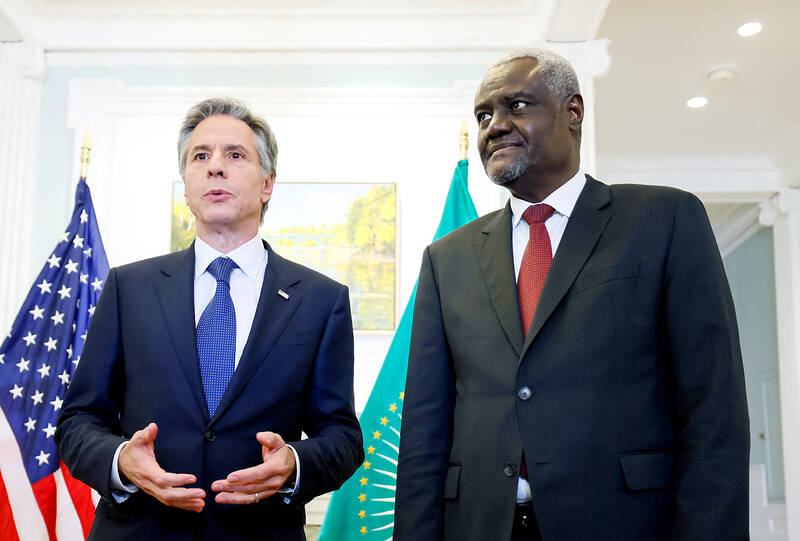The US needs to maintain security and ensure the peaceful resolution of disputes in the Pacific region, as a cross-strait crisis would be “bad for the entire world,” US Secretary of State Antony Blinken said on Friday.
Blinken was asked in an interview on Canadian television channel TVA Montreal if Russia’s invasion of Ukraine has raised concerns in Washington about the risk of a Chinese attack on Taiwan.
“It is a worry to us because ... [we] are seeing more repression in China and more aggression on the outside, including on Taiwan,” Blinken said.

Photo: REUTERS
Taiwan’s 50 years of success — made possible by the peace and stability that prevail in the region — could be jeopardized by an increasingly assertive Beijing, he said.
“Maritime trade in that area represents 50 percent of global trade every day,” he added.
Most of the world’s smartphones and other devices use semiconductors made in Taiwan, he said.
As a crisis in Taiwan “will be bad for the entire world,” the US must “maintain security ... [and] resolve issues” in the Pacific region peacefully, he said.
The US top diplomat has in the past few weeks issued a series of warnings about the risk of war in the Taiwan Strait.
Speaking at Stanford University on Monday last week, Blinken said that Beijing plans to annex Taiwan on a “much faster timeline” and has decided that the “status quo” is no longer acceptable.
He reiterated the statement two days later at a US Department of State news conference.
Separately, Lieutenant General James Jarrard, deputy commanding general for the US Army Pacific, at a teleconference hosted by the Pentagon on Thursday said that the US is “doing everything we can to prevent and deter tensions from escalating into a crisis or even a conflict” between Taiwan and China.
The US is working with its allies and partners toward preserving “a peaceful environment” in the Indo-Pacific region, he said.
Jarrard refused to comment on the likelihood of Taiwan participating as an observer in the Joint Pacific Multinational Readiness Capability (JPMRC) exercise taking place in Hawaii from tomorrow to Nov. 9.
“We are continuing to provide assistance to Taiwan, just like we have done previously, and want to make sure that we are doing what we can to help them maintain the status quo, just as our senior civilian leaders have directed us to,” he said.
JPMRC rotation 23-01 is a multinational exercise involving the US Army’s 25th Infantry Division, 354 participants from the armies of Indonesia, the Philippines and Thailand, and observers from 12 countries.
The drills at the newly established Joint Pacific Multinational Readiness Center are designed to improve the readiness and capabilities of US and allied forces when conducting joint operations on archipelago and jungle terrain common to the region, the US Army Pacific said.

MORE VISITORS: The Tourism Administration said that it is seeing positive prospects in its efforts to expand the tourism market in North America and Europe Taiwan has been ranked as the cheapest place in the world to travel to this year, based on a list recommended by NerdWallet. The San Francisco-based personal finance company said that Taiwan topped the list of 16 nations it chose for budget travelers because US tourists do not need visas and travelers can easily have a good meal for less than US$10. A bus ride in Taipei costs just under US$0.50, while subway rides start at US$0.60, the firm said, adding that public transportation in Taiwan is easy to navigate. The firm also called Taiwan a “food lover’s paradise,” citing inexpensive breakfast stalls

TRADE: A mandatory declaration of origin for manufactured goods bound for the US is to take effect on May 7 to block China from exploiting Taiwan’s trade channels All products manufactured in Taiwan and exported to the US must include a signed declaration of origin starting on May 7, the Bureau of Foreign Trade announced yesterday. US President Donald Trump on April 2 imposed a 32 percent tariff on imports from Taiwan, but one week later announced a 90-day pause on its implementation. However, a universal 10 percent tariff was immediately applied to most imports from around the world. On April 12, the Trump administration further exempted computers, smartphones and semiconductors from the new tariffs. In response, President William Lai’s (賴清德) administration has introduced a series of countermeasures to support affected

CROSS-STRAIT: The vast majority of Taiwanese support maintaining the ‘status quo,’ while concern is rising about Beijing’s influence operations More than eight out of 10 Taiwanese reject Beijing’s “one country, two systems” framework for cross-strait relations, according to a survey released by the Mainland Affairs Council (MAC) on Thursday. The MAC’s latest quarterly survey found that 84.4 percent of respondents opposed Beijing’s “one country, two systems” formula for handling cross-strait relations — a figure consistent with past polling. Over the past three years, opposition to the framework has remained high, ranging from a low of 83.6 percent in April 2023 to a peak of 89.6 percent in April last year. In the most recent poll, 82.5 percent also rejected China’s

PLUGGING HOLES: The amendments would bring the legislation in line with systems found in other countries such as Japan and the US, Legislator Chen Kuan-ting said Democratic Progressive Party (DPP) Legislator Chen Kuan-ting (陳冠廷) has proposed amending national security legislation amid a spate of espionage cases. Potential gaps in security vetting procedures for personnel with access to sensitive information prompted him to propose the amendments, which would introduce changes to Article 14 of the Classified National Security Information Protection Act (國家機密保護法), Chen said yesterday. The proposal, which aims to enhance interagency vetting procedures and reduce the risk of classified information leaks, would establish a comprehensive security clearance system in Taiwan, he said. The amendment would require character and loyalty checks for civil servants and intelligence personnel prior to